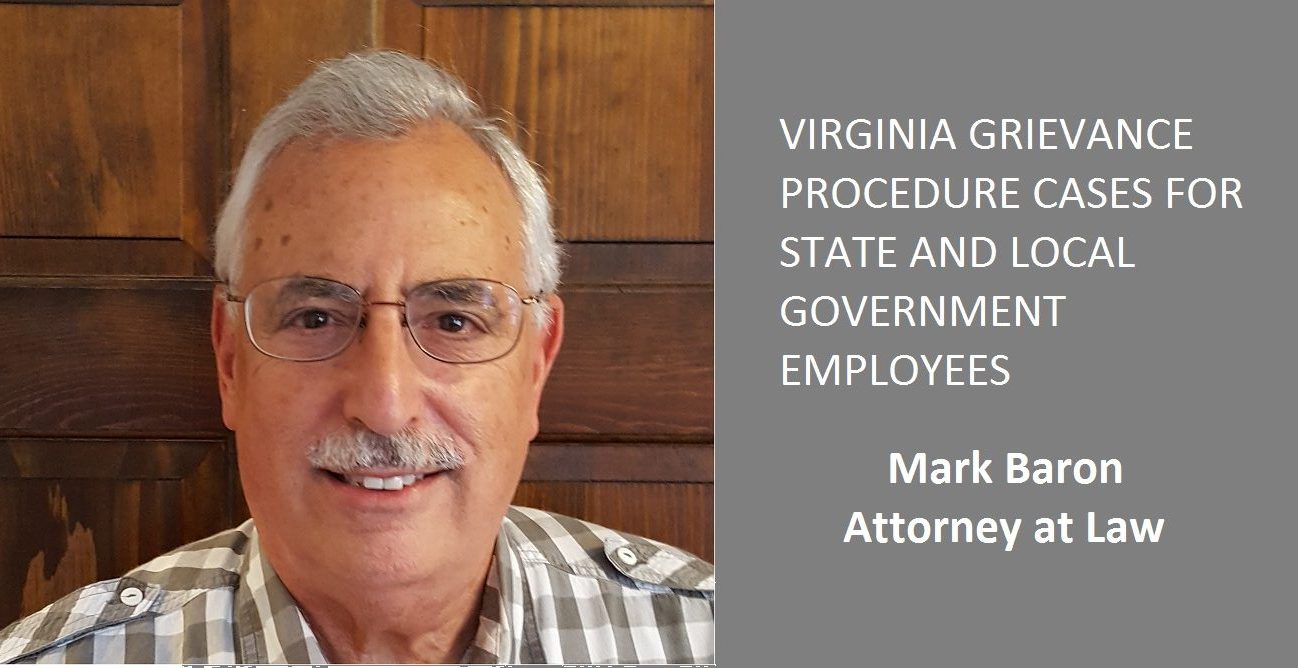My goal has always been to provide a personalized and effective representation of Virginia State Government and Local Government Employees from all geographic regions of Virginia–Northern (“NoVA”), Central, Southern, Eastern, and Western–involved in Virginia Grievance Cases, using the Virginia State Government Grievance Procedure or Virginia Local Government Grievance Procedures. These are employees who are facing adverse employment actions up to and including a dismissal. They are employees from almost all of the different agencies or departments of state and local government, including but not limited to police departments and public university and college departments, cities, counties, towns, and some state created boards. They are employees from some of lowest levels of non-management positions, as well as from some of the highest levels of management. I strive to provide my services at a Reasonable Cost! To this end, I do offer FREE BRIEF INITIAL PHONE CONSULTATIONS. It is important to note that obtaining legal counsel at the early stages of defending against an adverse employment action can provide a critical edge in one’s favor. Generally, it is best to consult with legal counsel at the first real sign that trouble is brewing at work that could lead to an adverse employment action. Waiting until a very short time before one’s grievance case is going to be heard at a grievance hearing reduces the chances of an employee’s success at the hearing. My motto is consultation, not hesitation! Since most adverse employment actions and grievance procedures have several steps to them (excluding a termination situation, which may only have a “due process” notification requirement before the employee’s case can proceed to a grievance hearing), I am often able to offer sound advice to my clients before their cases ever reach the stage of a formal hearing provided the client sees me in a timely manner. In some situations, this advice results in not even having to suffer the actual formal adverse employment action being issued in the first place. One simple example of this kind of advice is that the employee should NEVER trust or turn to for help the Human Resource Unit of his or her employer. Doing so is a TRAP. Not only does this not help one’s situation, but it often makes the situation harder to overcome. What employees too often fail to realize is that a grievance procedure IS A LEGAL PROCEDURE which is often disguised as a simplistic process where there is no need to be represented by competent and experienced legal counsel. This common misperception usually has disastrous consequences. When a government employee uses a grievance procedure to pursue his “case” against the agency the employee works for, this procedure leads to a “grievance hearing” before an administrative law judge or panel, and in many important ways this “hearing” is conducted like a non-jury trial in court, with cross-examination of witnesses being permitted, and a written decision deciding who won or lost the hearing. Having the benefit of an experienced grievance lawyer who is familiar with applicable work policies and precedential grievance decisions and court decisions and statutes and who knows how to thoroughly prepare is the most important thing the employee-grievant can do to greatly increase the odds of prevailing at the hearing. It is also important to note that an administrative law process, i.e., a grievance procedure/process, for a government employee leading to the hearing before an administrative law judge or panel in situations where the government employee faces an adverse employment action is a specific subset of what is commonly referred to as “Employment Law.” The greater realm of employment law, however, often enters into administrative law processes such as Virginia’s grievance procedures for government employees when employment laws apart from those administrative processes are relevant to a particular administrative law case. An example of this could be applicable laws such as anti-retaliation laws prohibiting a public employer from punishing a public employee over the employee having engaged in what is “protected” activity” under one or more state or federal laws, including but not limited to the First Amendment and laws outlawing discrimination in the workplace. Of course, the usual burden of proof in such a case is shifted from the employer to the employee-which means not every claim of unlawful retaliation is going to prevail. Each case has to be looked at on a case by case basis.
I have authored two unique, companion books on government employee rights concerning successfully defending against adverse employment actions up to and including dismissal cases. My books are available on Amazon.com at a modest cost. My books can be found at Amazon.com by going to “Books” and then entering my name in quotes, i.e., “Mark Baron,” or entering the titles of my books: SAVING PUBLIC SERVICE CAREERS FROM ATTACK and SAVING PUBLIC SERVICE CAREERS FROM ATTACK: CASES. The first book–SAVING PUBLIC SERVICE CAREERS FROM ATTACK–is in the nature of a course on effective strategies to be employed in state, local, or federal administrative law processes to defeat adverse employment actions taken against most any career government employee–including how to select the right lawyer. The second book–SAVING PUBLIC SERVICE CAREERS FROM ATTACK: CASES–contains real case stories from my own case files, which demonstrate how I put into effect the strategies covered in the companion book: SAVING PUBLIC SERVICE CAREERS FROM ATTACK.
I also represent employees who are trying to obtain unemployment compensation benefits through the Virginia Employment Commission. In addition, I defend the licenses of Virginia-licensed professionals before state licensing boards. Also, I do from time to time get involved with defending local government public school students and teachers and administrative staff facing administrative law discipline proceedings.
My primary geographic area of practice is anywhere in Virginia. However, I will do expanded travel outside of Virginia for speaking engagements on the topics covered in my books.
__________________________
2023 Case Notes:
During this year, I’ve continued to feel the joy of my long run at assisting and representing employees of the Commonwealth of Virginia and of Virginia local governmental entities involved in grievance matters. Indeed, it was one of my busiest and most successful years ever. In just a few compressed months alone, I had 8 grievance hearings and one negotiated settlement. In 4 of these matters, the agencies were represented by outside legal counsel (not government employees), including some well known private law firms who represent employers in private employment cases. In these matters, the Commonwealth did not seem opposed to paying those private lawyers their fees. I did not mind at all going up against these heavy hitters with all their resources at their beck and call. If fact, when I win a case against one of these private law firms, the agencies are often reluctant to even think about doing an appeal. I’m fairly confident that the agencies at that point have no further appetite for expending their public monies. And speaking of appeals, in one of these cases this past year where a non-government lawyer (who was acting as a legal advocate, not as a lawyer) represented the agency, after I secured a grievance hearing decision victory for my client, the agency took an appeal to the head of EDR. This case involved only a Group I level Written Notice (the lowest level of formal discipline), something which most employees might not choose to contest. But my client wanted to fight the charge as a matter of principle, and I had to respect that. I was kind of surprised by the agency taking an appeal in this case because if it lost, that decision would then have the force and effect of being valid precedent, which could be cited in other similar cases to help obtain a victory. In any event, I filed a rebuttal to the appeal, and the grievance hearing decision victory was upheld for my client. Thus, a very useful precedential appeal decision was obtained in this rather unusual case. I say unusual because the client was charged with disobeying a direct order or instruction to do something, and the client admitted to intentionally and knowingly not following a supervisor’s instruction. Now sometimes, I can win such a case by proving that the there was no intent to not follow the order in question (which of course I could not do in this case, since the client admitted to deliberately not following the instruction or order in question) or by the application of mitigating circumstances. The winning strategy I employed in this case was something fairly unusual to say the least. I maintained that by issuing the order the agency itself was the one in violation of applicable policy, a policy which in this unique situation actually gave my client the choice of whether or not to follow the order or instruction–a choice which the agency acting through my client’s supervisor did not permit my client to exercise. This strategy completely flipped things around such that it was the agency that found itself in the defensive posture of having deal with my accusation that it was the agency who violated policy, not my client. Of course, the agency could not really defend against my accusation; so it simply tried to completely ignore it–which of course was certainly a failing strategy to employ, and the victory went to my client.
For more information impacting Virginia grievance law, please see my Page entitled “Noteworthy Developments Related to Virginia Grievance Procedure.”


